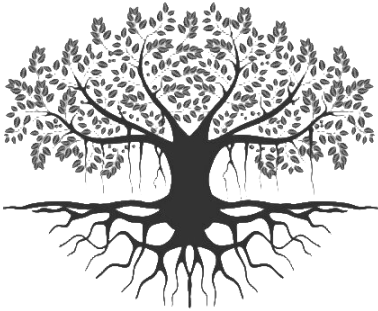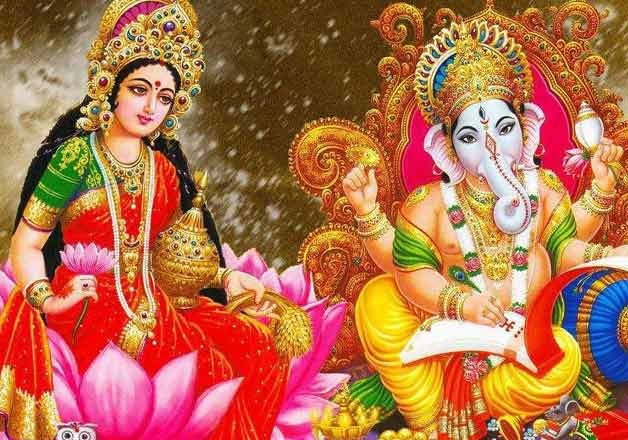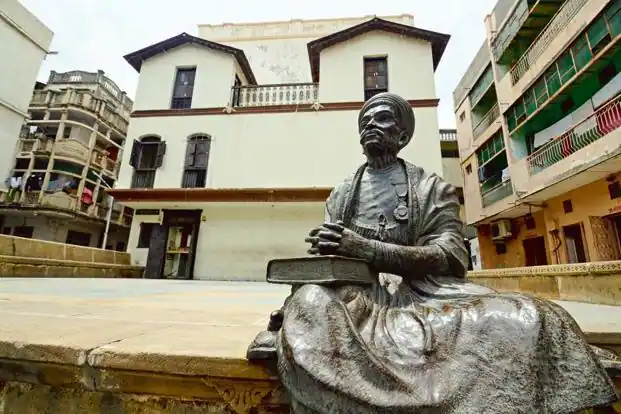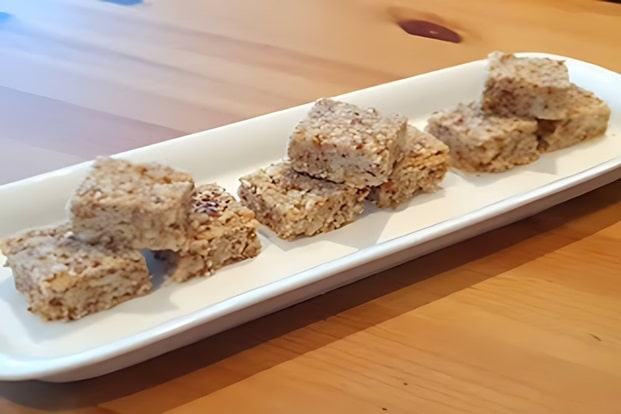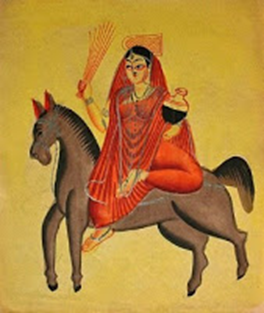
Sheetala Satam
When:
Seventh day after full moon (Vad Satam) in the month of Shravan as per the Gujarati calendar.
Seventh day after full moon (Vad Satam) in the month of Shravan as per the Gujarati calendar.
The Ritual:
Clean the main cooking appliance at home the night before. Apply Kum Kum on the cooking appliance (or perform Pooja your way) and pray for Sheetala Goddess to come home and bring good health for all.
Take a bath in cold water and eat cold healthy food that is prepared a day earlier (on Randhan Chath). Plant a tree if you can.
Take a bath in cold water and eat cold healthy food that is prepared a day earlier (on Randhan Chath). Plant a tree if you can.
The Background
Goddess Sheetala came about to bring good health and fight disease. Sheetala means one who cools. Sheetala is represented as a young maiden riding a donkey crowned with a winnowing-fan, holding a short broom and a pot full of healing water. The avatar is symbolic of cleanliness, cooling and healing.
In earlier times, every household had a fire in the hearth that was burning all day. The day before Satam day, was Randhan Chath or the day of cooking. After cooking food for the Satam day, the fire in the hearth of every Hindu house is extinguished. It was then plastered with cow dung (believed to be a natural cleanser) and a mango sapling is planted therein (nurturing the sapling was symbolic of nurturing good health, also the intent was the whole family enjoys the coolness of the mango tree eventually and the sweet taste, like that of the ripe fruit of the mango, is present in the cooking). The hearth was not lit on the Satam day. Extinguishing the hearth ensured coolness at home. It was believed that the goddess rolls in the cold ashes of the hearth on the day, and it must be kept cold so she wouldn’t burn up.
The tradition of feasting on day-old dishes during seasonal transitions is to cool the body and fortify the immune system. In modern parlance, this could be viewed as a probiotic meal eaten around the change of the season to balance one’s digestion. Consumption of cool food helps to provide stomach and digestive system benefits. Taking a bath in cold water also has health benefits like increasing blood circulation and easing stress.
Some ladies also performed Pooja of Shitala goddess, and thereafter performed the Pooja of seven young ladies (Goinis) who they lovingly provide lunch.
In earlier times, every household had a fire in the hearth that was burning all day. The day before Satam day, was Randhan Chath or the day of cooking. After cooking food for the Satam day, the fire in the hearth of every Hindu house is extinguished. It was then plastered with cow dung (believed to be a natural cleanser) and a mango sapling is planted therein (nurturing the sapling was symbolic of nurturing good health, also the intent was the whole family enjoys the coolness of the mango tree eventually and the sweet taste, like that of the ripe fruit of the mango, is present in the cooking). The hearth was not lit on the Satam day. Extinguishing the hearth ensured coolness at home. It was believed that the goddess rolls in the cold ashes of the hearth on the day, and it must be kept cold so she wouldn’t burn up.
The tradition of feasting on day-old dishes during seasonal transitions is to cool the body and fortify the immune system. In modern parlance, this could be viewed as a probiotic meal eaten around the change of the season to balance one’s digestion. Consumption of cool food helps to provide stomach and digestive system benefits. Taking a bath in cold water also has health benefits like increasing blood circulation and easing stress.
Some ladies also performed Pooja of Shitala goddess, and thereafter performed the Pooja of seven young ladies (Goinis) who they lovingly provide lunch.
The Story
Once in the month of Shravan, the day of Randhan chat (day of cooking) came. A lady had two daughter in laws. She asked the younger daughter-in-law to cook. The younger one was cooking until midnight, when suddenly her son started crying. So, leaving her work, she attended to him. However, she fell asleep due to exhaustion. The stove was burning. After midnight Goddess Sheetala visited the house to roll in the cold ashes of the hearth. But instead she began to burn in the stove. So the Goddess cursed the younger daughter in law.
In the morning, the younger daughter in law saw that the stove was burning and her son was dead. His body was burnt.
She began to cry. She realized that Goddess Sheetala must have cursed him. She resolved to seek the Goddess’s forgiveness so everything would be all right again. She took her son in her hands and went in search of the goddess. Along the way he saw a pond. The pond was full of water but no one drank from it.
In the morning, the younger daughter in law saw that the stove was burning and her son was dead. His body was burnt.
She began to cry. She realized that Goddess Sheetala must have cursed him. She resolved to seek the Goddess’s forgiveness so everything would be all right again. She took her son in her hands and went in search of the goddess. Along the way he saw a pond. The pond was full of water but no one drank from it.
The pond asked, “Sister, where are you going?”
The younger daughter in law said, “I am going to the Goddess to get rid of her curse.”
The pond said, “Sister, what sin have I committed that someone dies if they drink my water?” Please ask the Goddess for removal of my curse. Further ahead she met two bulls. Bells hung from their necks and the two fought. Seeing her, the two bulls asked, “Sister, where are you going?”
The younger daughter in law said, “I am going to the Goddess to get rid of her curse.”
The bulls said, “What sin have we committed? We are always fighting. Please ask the Goddess for removal of our curse”.
She kept walking and further ahead she saw an old lady sitting under a Bordi tree, scratching her head. Seeing her, the old woman said, “Sister, my head is very itchy. Please help me and take a look.”
Although she was in a hurry, she put her son in the old lady’s lap and sat down to help her.
After a while, old lady’s itching disappeared. Blessing her, she said, “Let you problem be solved, like you helped me solve mine.” The boy in old lady’s lap was resurrected. She realized that this old lady was none other than the Goddess herself. So she fell at her feet.
She asked for forgiveness and removal of the curse of the pond and the bulls. The Goddess said that if you drink the water from that pond the pond’s curse will be removed. If you ring of the bells on the bulls, their curse will be removed. Happily, the daughter in law took her son back and also helped the pond and the bulls.
When she got home, she told everyone about her experience. Her Co-sister, the older daughter in law, was jealous.
In the next Randhan Chhath, it occurred to older daughter in law that she should do the same. So she kept the stove burning that night. After midnight Goddess Sheetala visited the house to roll in the cold ashes of the hearth. But instead she began to burn in the stove. So the Goddess cursed the older daughter in law.
When the older daughter in law woke up in the morning, she saw her son lying dead. Instead of being saddened by the incident, the older daughter in law was happy and she too took her son and went in search of the Goddess.
Along the way he saw a pond. The pond was full of water but no one drank from it.
The pond asked, “Sister, where are you going?”
The older daughter in law said, “I am going to the Goddess to get rid of her curse.”
The pond said, “Sister, what sin have I committed that someone dies if they drink my water?” Please ask the Goddess for removal of my curse.
But the older daughter in law immediately refused. Further ahead she met two bulls. Bells hung from their necks and the two fought. Seeing her, the two bulls asked, “Sister, where are you going?”
The older daughter in law said, “I am going to the Goddess to get rid of her curse.”
The bulls said, “What sin have we committed? We are always fighting. Please ask the Goddess for removal of our curse”.
But the older daughter in law immediately refused.
She kept walking and further ahead she saw an old lady sitting under a Bordi tree, scratching her head.
Seeing her, the old woman said, “Sister, my head is very itchy. Please help me and take a look.”
The older daughter in law angrily refused.
She kept looking everywhere but never found the Goddess. She came back home sad and crying. She said, “O Goddess, please bless everyone like you blessed my co-sister.”
The younger daughter in law said, “I am going to the Goddess to get rid of her curse.”
The pond said, “Sister, what sin have I committed that someone dies if they drink my water?” Please ask the Goddess for removal of my curse. Further ahead she met two bulls. Bells hung from their necks and the two fought. Seeing her, the two bulls asked, “Sister, where are you going?”
The younger daughter in law said, “I am going to the Goddess to get rid of her curse.”
The bulls said, “What sin have we committed? We are always fighting. Please ask the Goddess for removal of our curse”.
She kept walking and further ahead she saw an old lady sitting under a Bordi tree, scratching her head. Seeing her, the old woman said, “Sister, my head is very itchy. Please help me and take a look.”
Although she was in a hurry, she put her son in the old lady’s lap and sat down to help her.
After a while, old lady’s itching disappeared. Blessing her, she said, “Let you problem be solved, like you helped me solve mine.” The boy in old lady’s lap was resurrected. She realized that this old lady was none other than the Goddess herself. So she fell at her feet.
She asked for forgiveness and removal of the curse of the pond and the bulls. The Goddess said that if you drink the water from that pond the pond’s curse will be removed. If you ring of the bells on the bulls, their curse will be removed. Happily, the daughter in law took her son back and also helped the pond and the bulls.
When she got home, she told everyone about her experience. Her Co-sister, the older daughter in law, was jealous.
In the next Randhan Chhath, it occurred to older daughter in law that she should do the same. So she kept the stove burning that night. After midnight Goddess Sheetala visited the house to roll in the cold ashes of the hearth. But instead she began to burn in the stove. So the Goddess cursed the older daughter in law.
When the older daughter in law woke up in the morning, she saw her son lying dead. Instead of being saddened by the incident, the older daughter in law was happy and she too took her son and went in search of the Goddess.
Along the way he saw a pond. The pond was full of water but no one drank from it.
The pond asked, “Sister, where are you going?”
The older daughter in law said, “I am going to the Goddess to get rid of her curse.”
The pond said, “Sister, what sin have I committed that someone dies if they drink my water?” Please ask the Goddess for removal of my curse.
But the older daughter in law immediately refused. Further ahead she met two bulls. Bells hung from their necks and the two fought. Seeing her, the two bulls asked, “Sister, where are you going?”
The older daughter in law said, “I am going to the Goddess to get rid of her curse.”
The bulls said, “What sin have we committed? We are always fighting. Please ask the Goddess for removal of our curse”.
But the older daughter in law immediately refused.
She kept walking and further ahead she saw an old lady sitting under a Bordi tree, scratching her head.
Seeing her, the old woman said, “Sister, my head is very itchy. Please help me and take a look.”
The older daughter in law angrily refused.
She kept looking everywhere but never found the Goddess. She came back home sad and crying. She said, “O Goddess, please bless everyone like you blessed my co-sister.”
The Message
The tradition is to remind us that cooking food and maintaining cleanliness is not just a task but a sacred act, as the love and care involved contributes to the good health of the family. Taking a bath in cold water and eating cold food contributes to good health. Planting a tree contributes to the environment. The story tells us that when parents are compassionate to others, their children are blessed.
Popular Posts
Copyright © 2024 WeGujarati. All Rights Reserved. Designed By The Creativity Studio

